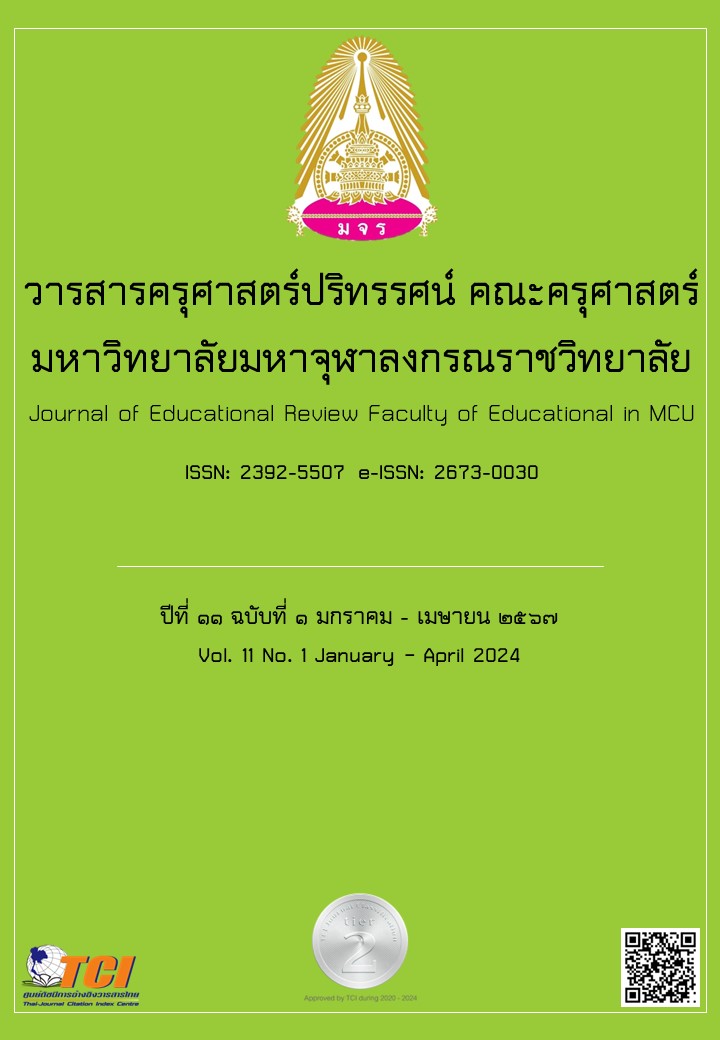AN INTERNAL QUALITY ASSURANCE MANAGEMENT RELATING TO THE MINISTERIAL REGULATIONS EDUCATIONAL QUALITY ASSURANCE B.E. 2561 OF SCHOOLS UNDER THE OFFICE OF SAMUT PRAKAN SECONDARY EDUCATION SERVICE AREA
Main Article Content
Abstract
The purpose of this research article was to study an internal quality assurance management relating to the Ministerial Regulations Educational Quality Assurance B.E. 2561 of schools under the office of Samut Prakan Secondary Education Service Area. It was a mixed research study with three steps: 1) studying the conditions and guidelines for an internal quality assurance management relating to the Ministerial Regulations Educational Quality Assurance B.E. 2561, 2) developing a model for an internal quality assurance management relating to the Ministerial Regulations Educational Quality Assurance B.E. 2561 of schools under the office of Samut Prakan Secondary Education Service Area, and 3) trialing and evaluation of the model. The sample group used in the quantitative research was 24 educational institution directors, 24 deputy directors of educational institutions in academic administration group, 24 teachers assigned to be responsible for internal quality assurance, a total of 72 people, and data providers in qualitative research, including school administrators, educational supervisors, and assigned teachers, a total of 9 people. Tools used in the research were questionnaires, semi-structured interviews, satisfaction assessment form using the format applying basic statistics and content analysis. The research results found that the internal quality assurance management relating to the Ministerial Regulations Educational Quality Assurance B.E. 2561 of schools under the office of Samut Prakan Secondary Education Service Area had 3 components: 1) Component of an internal quality assurance had 7 indicators. 2) Component of the administrative process (K-PDCA) in 5 steps: (1) Providing knowledge (Knowledge: K), (2) Planning (Plan: P), (3) Executing the plan (Do: D), (4) Inspection (Check: C) and (5) Correction and improvement (Act: A). 3) Component of an internal quality assurance management relating to the Ministerial Regulations Educational Quality Assurance B.E. 2561, there were 3 standards and the results of the model evaluation found that satisfaction assessment in overall was at a high level of practice, and the format was at the highest level.
Article Details

This work is licensed under a Creative Commons Attribution-NonCommercial-NoDerivatives 4.0 International License.
ทัศนะและความคิดเห็นที่ปรากฏในบทความในวารสารฉบับนี้ถือเป็นความรับผิดชอบของผู้เขียนบทความนั้นเพียงผู้เดียว และไม่ถือเป็นทัศนะและความรับผิดชอบของกองบรรณาธิการ
กองบรรณาธิการขอสงวนสิทธิ์ในการคัดเลือกบทความลงตีพิมพ์และจะแจ้งให้เจ้าของบทความทราบหลังจากผู้ประเมินบทความตรวจอ่านบทความแล้ว
ต้นฉบับที่ได้รับการตีพิมพ์ในวารสารครุศาสตร์ปริทรรศน์ คณะครุศาสตร์ มหาวิทยาลัยมหาจุฬาลงกรณราชวิทยาลัย ถือเป็นกรรมสิทธิ์ของคณะครุศาสตร์ มหาวิทยาลัยมหาจุฬาลงกรณราชวิทยาลัย ห้ามนำข้อความทั้งหมดหรือบางส่วนไปพิมพ์ซ้ำ เว้นเสียแต่ว่าจะได้รับอนุญาตจากมหาวิทยาลัยฯ เป็นลายลักษณ์อักษร
References
กระทรวงศึกษาธิการ. (2559). ประกาศกระทรวงศึกษาธิการ เรื่องให้ใช้มาตรฐานการศึกษาขั้นพื้นฐานเพื่อการประกันคุณภาพภายในสถานศึกษา. กรุงเทพมหานคร: กระทรวงศึกษาธิการ.
กระทรวงศึกษาธิการ. (2561). กฎกระทรวง การประกันคุณภาพการศึกษา พ.ศ. 2561. กรุงเทพมหานคร: กระทรวงศึกษาธิการ.
บุปผา ทองน้อย. (2557). การพัฒนารูปแบบการบริหารจัดการสู่งานประกันคุณภาพการศึกษาภายในที่มีประสิทธิภาพของโรงเรียนสังกัดสำนักงานเขตพื้นที่การศึกษามัธยมศึกษา เขต 39. ดุษฎีนิพนธ์ปรัชญาดุษฎีบัณฑิต. มหาวิทยาลัยนอร์ทกรุงเทพ.
ปรีดา บุญเพลิง, เสาวณีย์ สิกขาบัณฑิต และสิริกาญจน์ ธนวุฒิพรพินิต. (2562). การนำรูปแบบการบริหารโรงเรียนนิติบุคคลไปสู่การปฏิบัติระดับการศึกษาขั้นพื้นฐาน ในภาคตะวันออกเฉียงเหนือ. วารสารวิชาการ มหาวิทยาลัยนอร์ทกรุงเทพ. 8(1). 96-106.
พระเมธีปริยัติธาดา (บุญพรม จารุปญฺโญ) และคณะ. (2564). การพัฒนาระบบการบริหารจัดการการประกันคุณภาพการศึกษา โรงเรียนการกุศลของวัดในพระพุทธศาสนาในเขตจังหวัดภาคกลาง วารสารครุศาสตร์ปริทรรศน์ คณะครุศาสตร์ มหาวิทยาลัยมหาจุฬาลงกรณราชวิทยาลัย. 8(2). 1-15.
เยาวทิวา นามคุณ และฤตินันท์ สมุทร์ทัย. (2559). การสังเคราะห์งานวิจัยเกี่ยวกับการประกันคุณภาพภายใน. วารสารวิชาการมหาวิทยาลัยฟาร์อีสเทอร์น. 10(3). 56.
รัตนะ บัวสนธ์. (2554). การวิจัยและพัฒนานวัตกรรมการศึกษา. พิมพ์ครั้งที่ 2. นครสวรรค์: ริมปิงการพิมพ์.
สำนักงานเขตพื้นที่การศึกษามัธยมศึกษาสมุทรปราการ. (2565). ข้อมูลสารสนเทศ. แหล่งที่มา https://sesaosp.go.th. สืบค้นเมื่อ 15 ส.ค. 2565.
สำนักงานคณะกรรมการการศึกษาขั้นพื้นฐาน. (2561). ประกาศสำนักงานคณะกรรมการการศึกษาขั้นพื้นฐาน เรื่อง แนวปฏิบัติการดำเนินงานประกันคุณภาพการศึกษาระดับการศึกษาขั้นพื้นฐาน พ.ศ. 2561. กรุงเทพมหานคร: สำนักงานคณะกรรมการการศึกษาขั้นพื้นฐาน.
สำนักงานคณะกรรมการการศึกษาแห่งชาติ. (2544). คู่มือการประเมินผลภายในของสถานศึกษาตามมาตรฐานการศึกษา: การออกแบบระบบการประเมินผลภายใน. กรุงเทพมหานคร: วี.ที.ซี. คอมมิวนิเคชั่น.
สำนักงานรับรองมาตรฐานและประเมินคุณภาพการศึกษา. (2561). รายงานประจำปี 2561 สำนักงานรับรองมาตรฐานและประเมินคุณภาพการศึกษา (องค์การมหาชน). กรุงเทพมหานคร: สำนักงานรับรองมาตรฐานและประเมินคุณภาพการศึกษา.
สำนักงานเลขาธิการสภาการศึกษา. (2551). สภาวะการศึกษาไทย ปี 2550/2551 “ปัญหาความเสมอภาคและคุณภาพของการศึกษาไทย”. พิมพ์ครั้งที่ 2. กรุงเทพมหานคร: วี.ที.ซี.คอมมิวนิเคชั่น.
สำนักงานเลขาธิการสภาการศึกษา. (2562). มาตรฐานการศึกษาของชาติ พ.ศ. 2561. นนทบุรี: 21 เซ็นจูรี่.
สิริกาญจน์ ธนวุฒิพรพินิต และคณะ. (2563). หลักสูตรฝึกอบรมการประกันคุณภาพการศึกษาภายนอก ระดับการศึกษาขั้นพื้นฐาน. วารสารครุศาสตร์ปริทรรศน์ คณะครุศาสตร์ มหาวิทยาลัยมหาจุฬาลงกรณราชวิทยาลัย. 7(1). 121-132.
Fetterman, D. M. (1996). Empowerment Evaluation: An Introduction to Theory and Practice. In D. M. Fetterman, S. J. Kaftarian, A. Wandersman (Eds.), Empowerment Evaluation: Knowledge and Tools for Self-Assessment & Accountability. Thousand Oaks, CA: Sage.
Kusek, J. Z. & Rist, R. C. (2004). Ten Steps to a Results-based Monitoring and Evaluation System: A Handbook for Development Practitioners. Washington, D.C.: The International Bank for Reconstruction and Development/The World Bank.
Stufflebeam, D. L. & Shinkfield, A. (2007). Evaluation Theory Models and Applications. San Francisco, CA: Jossey-Bass.


